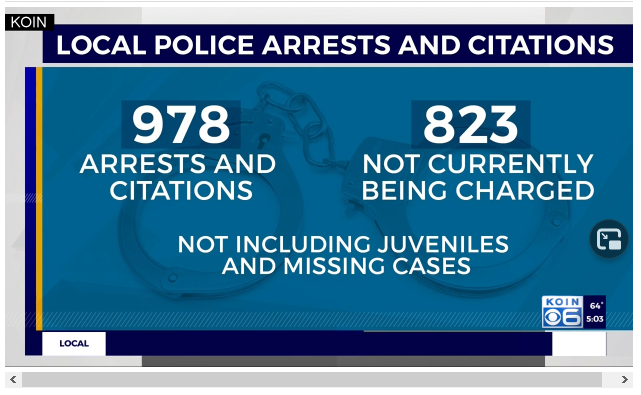|
Guest Column: Former district attorney says don't change Measure 11
Bend Bulletin, Nov 24, 2020 In a Nov. 12 editorial, The Bulletin’s editorial board claimed that mandatory sentencing for the most violent felonies was “ripe for change,” and that “people have been looking at the ways Measure 11 can get things wrong.” These are not new arguments. Measure 11 passed first in 1994 by 65% of voters, then was reaffirmed in 2000 when 73% rejected repeal. It mandates a five-year sentence for child molesters, eight for violent rape, 10 for first degree manslaughter, and 25 years for murder. Measure 11 does not apply to whatever drug crimes exist, or burglary, or even the lower felony levels of assault and rape. Long-time Measure 11 foe Sen. Floyd Prozanski, cited by The Bulletin’s editorial, is one of the usual suspects who for a quarter-century have been telling the vast majority of Oregonians they are wrong to vote for mandatory minimums. This would be understandable if it were still 25 years ago. Even I didn’t endorse Measure 11 when it first came on the ballot in 1994, which coincided with my first year as an elected district attorney. But it wasn’t long before I came to realize what many understood: that without mandatory minimums, privilege and status often affected the sentence of a convicted person. Rapists of a certain socioeconomic class could and often enough did get away with probation only, and served no time at all. Some people I helped convict of murder in the 1980s and early 1990s would often serve only eight years on what was touted as a life sentence. Eight years is not too much for the rape of a child. A cold-blooded, premeditated murderer deserves to serve at least 25 years, not a third of that. There is no question that Measure 11 has lessened racial disparities in sentencing for the most severe and violent crimes. There is no evidence that it has increased conviction rates. What it has increased is accountability, and it’s for that very reason certain prosecutors like Deschutes DA John Hummel avoid charging under Measure 11. They apparently prefer the old system, where who you knew helped decide your sentence, and victims had no rights. The effort to “refashion” Measure 11 will come early in the 2021 legislative session and will be about repeal, not “adjustment.” The “presumptive sentencing” system The Bulletin’s editorial referred to simply set maximums, not minimums, and gave rise to the very inequities that drove support for Measure 11. In 2019 the Legislature dismantled the portion of Measure 11 affecting juvenile sentencing late at night and as much in the dark as possible. They did not refer the measure to voters, as they should have. In 2021 they will again, late at night and with little or no public notice, gut what voters have resoundingly said twice what they want. And if this isn’t bad enough, there will be promises that the changes “will only apply in the future.” They made the exact same claims when they gutted capital punishment in SB 1013, and now we are told it is retroactive. Joshua Marquis was district attorney in Astoria from 1994-2018. He was chief deputy DA in Bend from 1990 to 1994. ### During the 2019 Oregon legislative session, most Democratic lawmakers (not Sen. Betsy Johnson or Rep. Brad Witt or Rep. Jeff Barker) along with four Republicans (bribed with special projects for their districts) voted to erase the vote of 74% of Oregonians. Those Oregonians, in 2000, reaffirmed the part of Measure 11, a sentencing bill first passed in 1994, that holds older teenagers accountable, making "adult time for adult crime."
Measure 11 applies only to the violent crimes of murder, manslaughter, rape, robbery, and kidnapping. Since the legislature's vote in 2019, not one person under the age of 19 has been "bound over" as an adult for murder. Not even for the robbery and murder of 18-year-old Ian Olson. Olson's killer was 15 at the time (he's now 17). Shooting Ian Olson in the head was the culmination of a two-month binge of violent assaults, a dozen of them. The killer will remain in the juvenile system. Under no circumstances can he be held past the age of 25. He has no record, for in fact he was never "convicted." Based on my experience, under Measure 11 the most likely outcome would have been that the young attacker would plead to First Degree Manslaughter, be sentenced to 10 years, and serve all that time in the Oregon Youth Authority, not in an adult prison. Now, he will have no record whatsoever. There will be no permanent record of him having been "adjudicated". When he is released, he can truthfully answer "No" when asked, "Have you ever been convicted of a felony?" In a Eugene case, where a 16-year-old beat a sleeping homeless man to death, an even greater injustice is possible. According to a report by Noelle Crombie in the Oregonian: "State officials this week said Kirkpatrick [who has been charged with murder] is subject to a legal loophole that could have implications for his sentence if he is found guilty. By law, the Oregon Youth Authority is allowed to lock up offenders who are sentenced before they turn 19. if Kirkpatrick is found guilty and is sentenced after age 19, he is only eligible for probation. He turns 19 later this year." These cases are difficult for journalists to cover. Court records, even arraignments, are not public, though the actual proceedings must be. A case involving a juvenile is reported on only when the reporter discovers the date and location of a court hearing, or learns about it from the victim's family. Otherwise, the crime and its perpetrator become the tree that makes no sound because it fell when nobody was around to hear. What's next in the dismantling of the people's vote? The wholesale abolition of Measure 11 as it applies to adults. Convicted of murder, a person would likely spend only eight years in prison, instead of 25. A man convicted of violent rape or rape of a child (Rape in the First Degree), instead of an eight-year sentence currently, could (and sometimes did before Measure 11 was enacted) get probation. This isn't justice. It's worth contacting your legislator and telling them to abide by the people's repeated votes. ###
Even I have been reluctant to criticize other prosecutors, since there are often other issues of which observers are ignorant.
But the malfeasance and dishonesty of the new District Attorney in Portland, Mike Schmidt, demands comment. The producers at KOIN said there was too much fear about speaking out, and that nobody else was willing to go on air and say what I did on the record. Schmidt worked less than five years as a junior prosecutor in Portland before taking a series of jobs in the state bureaucracy. He was elected by a wide margin in May, with only a 47% voter turnout, and was scheduled to take office in January. Schmidt's predecessor, Rod Underhill, had endorsed Schmidt's opponent and abandoned his post early, likely so that he wouldn't be associated with Schmidt's positions. Schmidt had converted to George Soros-like dogma which calls for DAs not to prosecute many crimes. He has already announced a long list of crimes, even felonies, that he won't prosecute. He's refused to file charges in over 90% of the arrests made of rioters in Portland over the last 3 months. My quotes from KOIN's November 1 story :: “If the prosecutor decides there will be no justice, there will be no justice” |
JOSHUA MARQUIS on
criminal justice, animal welfare, and the nature of the relationship between popular culture and the law. Archives
March 2024
See the Archives page for an index of all posts, including those prior to January 2019.
Categories |


